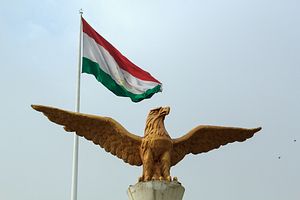Weeks after the Tajikistani government demolished its Islamic opposition, months after the crackdown against the Islamic Renaissance Party of Tajikistan began in earnest, the United States has finally offered comment. Now that Central Asia’s lone major Islamic party is all but annihilated, Washington has decided that a lukewarm, post-hoc statement would suffice against Tajikistan’s entrenched autocracy.
“Multiple political parties and choices are an important part of a stable and healthy society,” read a statement from the U.S. embassy obtained by Eurasianet. “Blanket persecution of all opposition will only accelerate the growth of radicalism, as disenfranchised citizens seek other, often more negative ways to express themselves and their views.”
The United State’s reticent response comes only after the latest round of persecution against the IRPT, a moderate opposition painted extremist by the government in Dushanbe. After the government tied a recent mutinous assault to apparent Islamists in the IRPT, Dushanbe levied fraud charges against the party’s lawyer. Further, on Tuesday, Tajikistan’s Supreme Court labeled the IRPT – with its 40,000 members – as a terrorist organization.
The narrative Dushanbe has crafted – that the IRPT presents a front for international Islamism, that the party remained bent on toppling Dushanbe’s legitimate government – has found a receptive international audience. The IRPT’s leaders is in exile, the rest of its leadership in jail or exile and its legal representation under pressure or already behind bars. And with the recent fall of Kunduz, just beyond the Tajik-Afghan border, concerns about Islamist spillover have only increased.
And it is only now, after the bulk of Dushanbe’s push to dismantle the IRPT has come to pass, that Washington has finally offered comment.
Unsurprisingly, the silence comes on the back of a burgeoning security relationship between the U.S. and Tajikistan. As a statement from Freedom House noted, “The United States government has a close relationship with Tajikistan’s security services, providing more than $130 million just in counternarcotics assistance since 2007. Many of the recipients of that assistance are those that will now be hunting down the IRPT.”
There’s a sense of too-little-too-late that will follow Washington’s reaction, and will hang as Dushanbe continues to mop up the remnants of the party.
Earlier this week, the University of Exeter’s John Heathershaw joined the reprobation against Washington’s silence. As Heathershaw wrote in Financial Times:
It is clear that the United States and Western powers have abandoned political engagement in Central Asia in the face of a resurgent Russia and the increasing significance of China as creditor, investor and patron…Western diplomats have lost hope in democratization and are driven by narrower security agendas. The US State Department became overshadowed by the Pentagon and its priorities of maintaining ‘lily pads’ around Afghanistan.
The United State’s statement is but the latest piece of evidence that Washington has sidelined concerns about humanitarian threats and political plurality in the region. Security, once again, has trumped any focus on regional human rights. And while Dushanbe’s economic underpinnings continue to falter, Tajikistan – and Central Asia – loses one of the best outlets for channeling the swell of political Islam, with the United States unwilling to say, let alone do, much about it.































